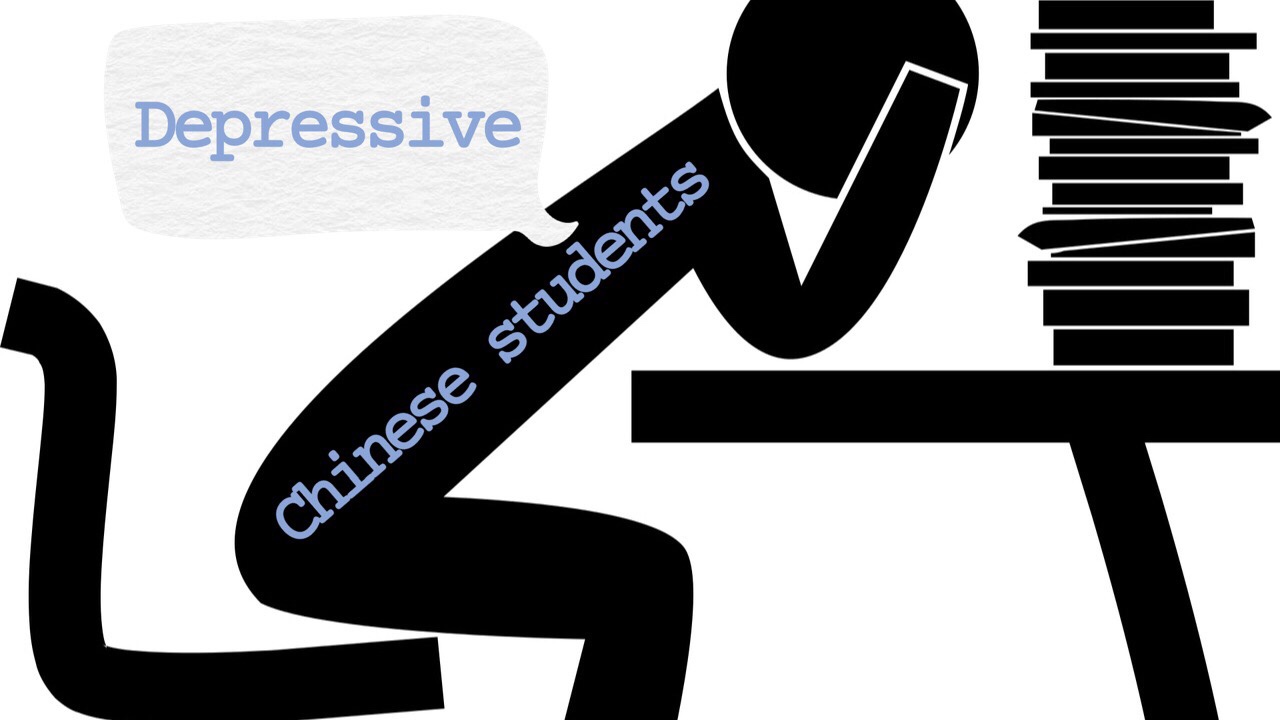Under China’s exam-oriented education, mental health classes are greatly ignored by schools. Is this putting students with depression into a difficult situation while increasing the risk of getting the disease?
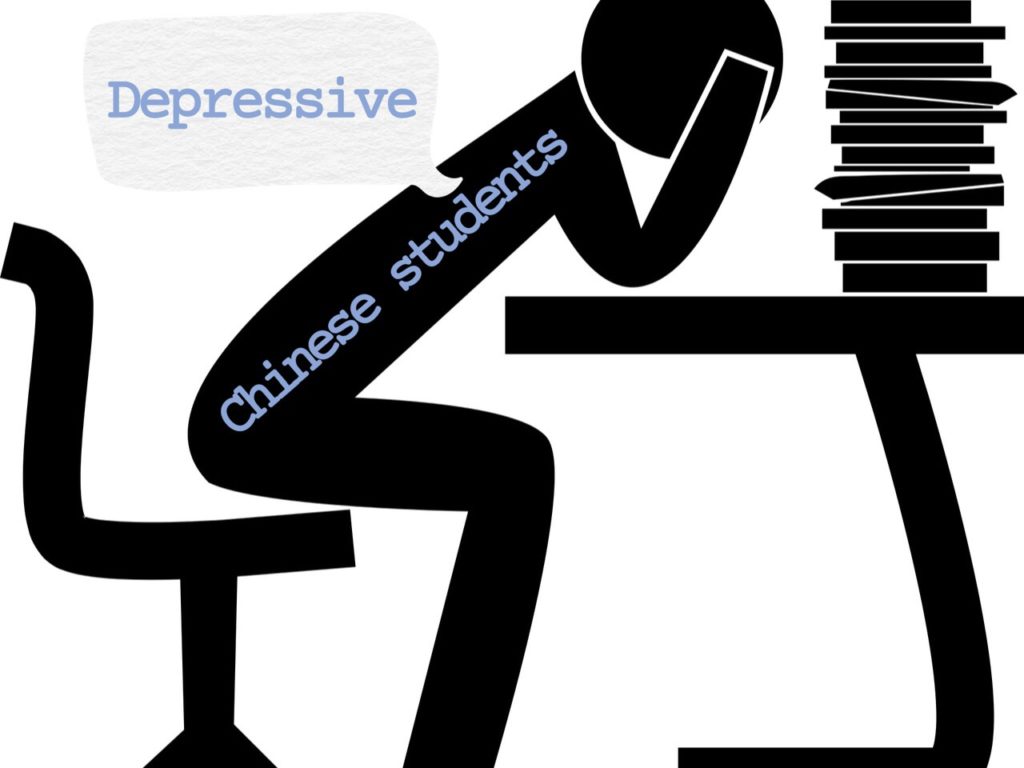
For Jingyao Li (assumed name), 2018 has been a year of great pain and relief in her life as a high school senior. Without the strict study routine, endless exercise and tutorial lessons, and having to get up early and work till late night, now she would no longer just be an outstanding and diligent student in the eyes of her parents and teachers. However, she got another new identity, that is, a depression sufferer, which she was taken completely by surprise and had no idea about what she needed to do next.
“Depression, it is like a blind spot in my life, and I grew up with no education that seemed to tell me exactly what to do when it happens. What’s more, the people around me also seem to be unfamiliar with it. At first, my mother just told me that I might be tired and the only thing I need to do is have a good rest. But when the doctor confirmed my depression, she was even more frightened than me,” said Jingyao.
As a matter of fact, Jingyao’s case is not uncommon in China. As early as 2016, a survey of freshmen by a psychological counselor at Peking University found that 30.04 percent were prone to depression. This situation has triggered a heated debate in the society, and as an important reason for this phenomenon, the imperfect mental health education also been caught up in the controversy.
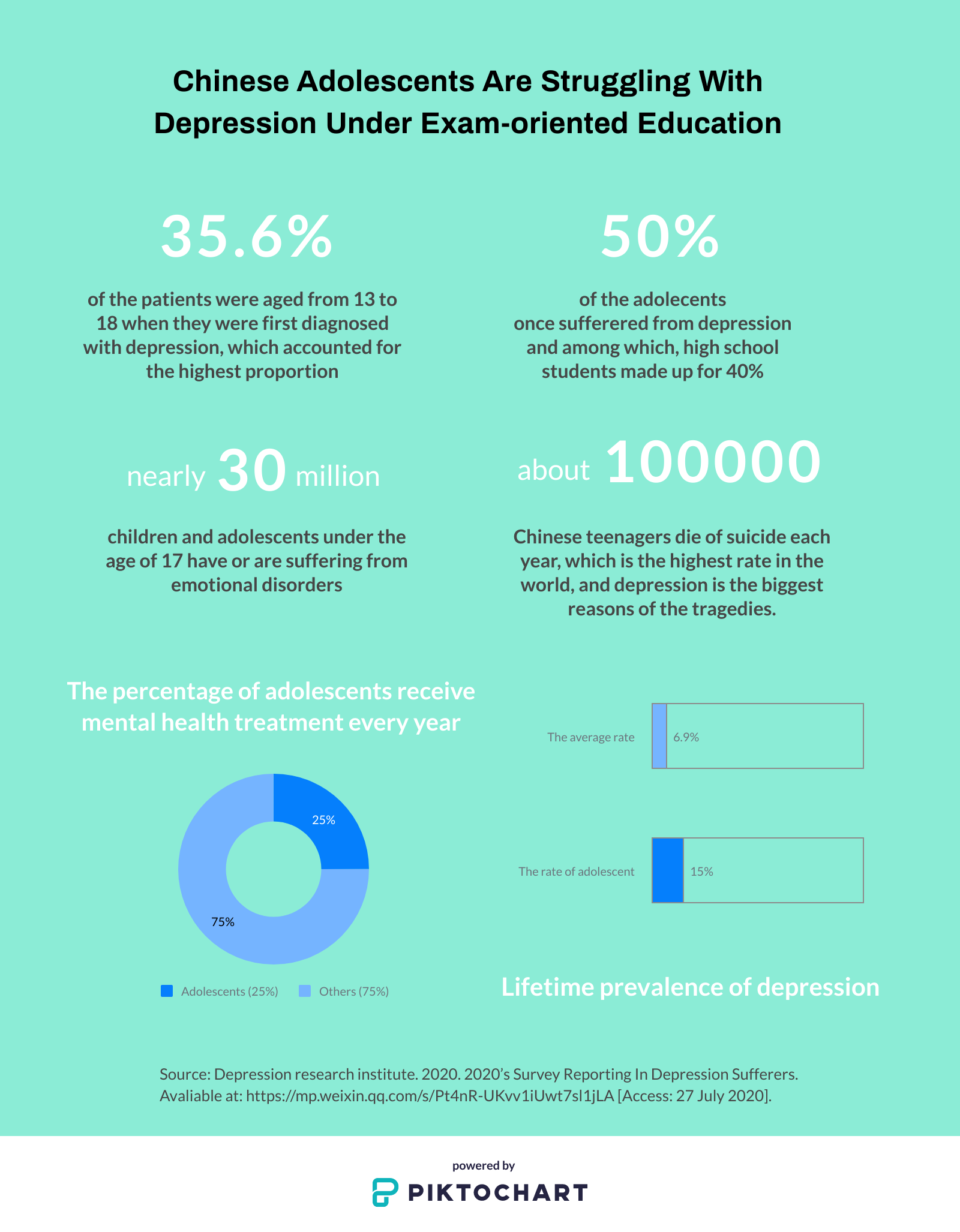
“There is no doubt that mental health education plays a significant part both in creating and tackling the problem. Peng Wang, a specialist in studying stigma of depression showed his dissatisfaction about the current education system. “Our nation really should think about making a change before the situation get worse,” said he.
Xiaoyu Fan, a postgraduate who suffered from depression, amazed at the total different attitudes of Chinese teachers and foreign countries’ towards mental health. “When I was studying in the United States, schools would provide detailed information about psychological counseling as soon as the orientation week started,” she said, “There were also emails before the exam weeks to emphasize the importance of mental health and remind those who have the kind of difficulties to seek help without hesitation. However, I studied at Zhejiang University for four years and did not know where the counseling room was until I graduated.”
Casting back her experience of receiving mental health education in the high school, Jingyao added that the quality of teaching in the limited classes was not high. “Psychology classes in school are more about instilling theoretical knowledge than solving problems. I remember the school once held a lecture on popularizing depression. Most of the time, the teacher just read the materials according to her presentation, which could not arouse people’s empathy and interest and most students were busy with their own things without listening,” said she .
On the one hand, the lack of mental health education blocks the main channel for adolescents to learn about mental illness. Thus it reduces the possibility for them to understand and get along with their peers who suffer from depression and tend to be silent and unsociable. On the other hand, students have little knowledge of how to save themselves and call for help when encounter psychological problems.
Yancheng Ma (assumed name), a young depression sufferer, who had a difficult time in school days because of the illness, recalled his tragic experience and said: “I used to do quite well on my study and exert great efforts on it. However, depression totally turned my life into a mess and I could not generate energy in the class.
Meanwhile almost none of my classmates and teachers considered my illness as a serious matter and they even looked down upon those who felt difficult to get rid of depression, which was the last straw for me. I failed to pluck up the courage to continue schooling and had to dropped out within a short time.”
“At present, China lacks systematic mental health education. For example, some core contents in the textbooks are not well-organized and presented in a jumbled way while curriculum does not exactly be implemented. And it is hard to change within a short time because of the long-term mode. To make the situation worse, we also have limited education channels to propagandize depression in society.” Qu Xiaoyan, professor of clinical psychology at Wuhan University says, “Only when there is an event around or in the media do people pay attention to it and go deeper into the details. Therefore, it can be seen that the current mental health education system does not exist in the majority of the population, and people tend to passively receive relevant knowledge.”
However, affected by the exam-oriented education, mental health courses are seriously neglected as schools put too much emphasis on students’ academic performance. Jingyao said that most of the high school’s mental health classes were occupied by test subjects, and sometimes psychology teachers even gave up their classes to other teachers.

Facing with the heavy study tasks and all kinds of tests, students receive little mental health education
Ruqi Li, a psychology professor and director of Taizhou Sunshine Psychological Service Center also criticized this status quo. He mentioned that he was annoyed by some teachers’ “indifference” during a mental health education training class. “Some were absent-minded all the time, and a group of people asked for leave without any sound reason.” He pointed out this might because “psychological lessons” are not required to take courses, or included in the evaluation of teachers’ performance.
In addition, the shortage of qualified professionals also traps the development of mental health education. “I once worked as an intern psychology teacher at a key high school in Hunan Province,” said Li Dai, a psychological consultant at Hunan University. “The school’s psychological center is reputed to be one of the best in the province. However, when I actually started my work, I found that there was only one full-time psychology teacher in the school, who was also a head-teacher in the class as well as director of moral education and teaching. His job vary from taking students to do exercises to hygiene inspection, of which psychology education is the least frequent.”
In fact, every year there is a large number of graduates from psychology school, but not many choose to work in this field. As one of the best university for psychology degree across the country, East China Normal University made a survey on the flow of graduates between 2013-2017. The study suggested most students choose to be human resource specialists, supply chain specialists and headhunting consultants while only a few of them became psychology teachers.
Talking about the phenomenon, Yingmin Chen, a professor of psychology at Wuhan University said: “Apart from personal interests and other individual factors, the limited job supply for teachers contributes a lot to this result. To change this situation, government should first take a number of policy measures to provide more positions for these graduates, and at the same time strengthen the professional quality, practical ability and continuing education training of in-service teachers.”
Much similar to the case of mental health education, the situation of psychology counseling is also far from optimistic. Lack of access to professional school counseling put some students, who have potential symptoms of depression, into deep trouble. Jingyao recalled: “It seems more of a way to solve your study problems. I consulted once when my illness was not very serious, however, what the teacher mentioned most was centered on how to avoid affecting my grades without any professional advice to my depression.”
Li Dai says: “Psychological counseling is a very young industry in China. There has only been more than ten years since the universities set up their psychological counseling centers. In the early stage, the number of graduates in this major were far from meeting the actual demands. Thus a group of psychiatrists or non-psychiatric doctors, as well as teachers specialize in psychology, ideology and politics joined the team, some of whom were just filling out the number.
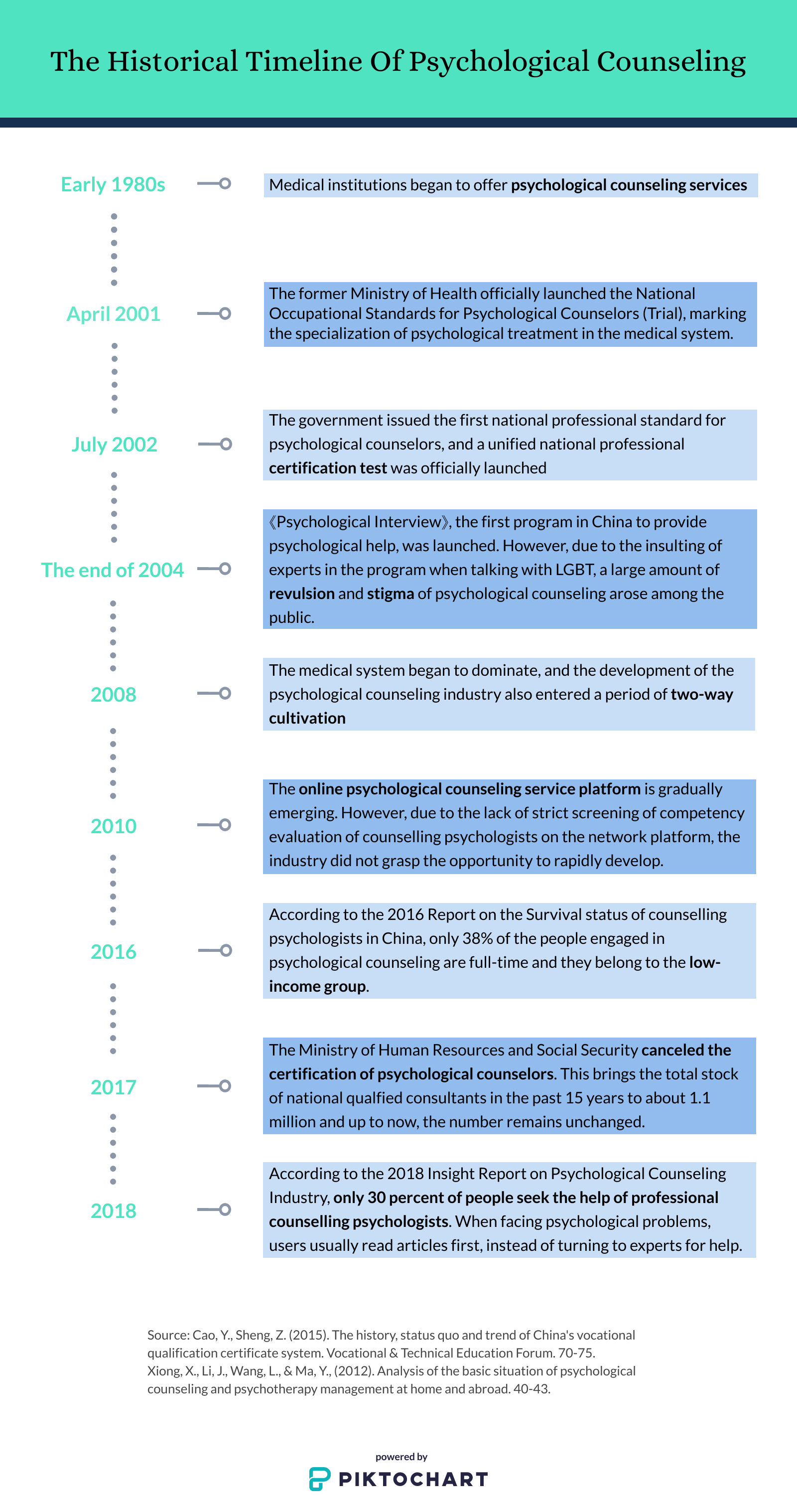
According to 2018 National Academic Congress on Mental Health, at present, the total number of psychiatrists and psychologists in China are less than 40,000 while counselling psychologist are no more than 3,000. And there are no scientific, planned and institutionalized laws and regulations in this respect, which means that the psychology teachers in the school are doing counseling according to their own conscience, morality and accepted professional ethics. In such case, it is still very difficult to offer effective help to students who tend to have depression or do the deep dives into subject matters.”
And as the first ‘school’ in our lives, family also does not take as an important role in adolescents’ mental health education. In the context of exam-oriented education, parents are more concerned about their children’s academic performance. Lin Hua, a high school teacher said that once she decided to put more emphasis on mental health during parent-teacher meeting after spotting a student in her class performed depressively and worrying that others were also under great pressure to study. Shortly after the conference began, she came to realized that for most parents, this part was unimportant and unnecessary.
In order to draw them back, she mentioned a student shared negative feelings including suicidal desire on social media at midnight, which was worth their attention. However, those parents immediately burst into a rage, angrily said why they still have time playing with mobile phones when they should fully concentrated on their studies, and some even felt confused about the students’ behavior by saying why they looked passively when they did not have to worry about anything except studying now.
“The lack of mental health education in China actually represents a social phenomenon,” says Peng Wang . “Born in a less developed era, the previous generation knew what it was like to be poor and physical needs naturally became their top priority, which was penetrated deep into their unconscious mind. Also, growing up in those days when mental illnesses did not highly prevailed, they tend to consider depression as a brand-new concept and pay less attention to it.”
However, this year with the advent of coronavirus, schools delayed their opening and most courses turned into online teaching. These changes for students, especially candidates for college entrance examination, they are faced with great pressure as study plans were disrupted and the distance education failed to achieve the desired effects. In such case, mental problems such as anxiety and depression began to occur frequently. The number of students affected have reached its peak in recent years, which made parents aware of the importance of mental health.
Shangqing Wen (assumed name), a parent who always puts child’s academic performance at the first place said, “My son studied at a boarding school and as one of the senior high graduates, he was busy in studying in his last year. We rarely have time to communicate with each other. If we had, the talk was always around his studies. Were it not for the crises, I really do not know if he would have these depressive emotions.”
On May 14th, WTO published its 2020 mental health report and also took note of China’s high incidence rate of depression, which reached up to 50 percent. This, to some extent, proved the weakness in metal heath education and soon raised great concerns in the industry. At the following 13th National People’s Congress, Qin He, President of Jilin University Of Foreign Languages, submitted a proposal for strengthening students’ Mental Health Education as a NPC delegate, hoping that the school could provide full-time teachers for psychological education. Besides, Dou Yanli, vice principal of a middle school in Shandong province, also called for a greater effort to the training of application-oriented talents as well as cultivating more professional faculties for mental health education.
In June, a college in Nanjing, Jiangsu province took the lead in organizing a psychological education training for head teachers. They experienced what people with depression would experience throughout the whole process of treatment, and the importance of implementing key measures for prevention. To put teachers in sufferers’ position, the activity pointed out the difficulties of mental health education, varying from communication barriers to active treatment, as well as the solutions towards them and the most ignored respects. This activity has promoted the scientific knowledge of fighting against depression and other psychological diseases in the campus and produced a positive domino effect.
“In the first place, educators need to make sure mental health education be an important part of the compulsory curriculum,” added Yanran, a national psychological consultant and psychological communication tutor. “And at the same time, we should avoid subject-based education and strengthen the integration and penetration of mental health courses and other subjects. Classes should focus more on cognitive activity rather than mere theoretical knowledge and integrating life education into it. Secondly, counseling and psychotherapy should be improved in schools to ensure that the psychological counseling room is the last line of defense set to protect students’ physical and mental health.”
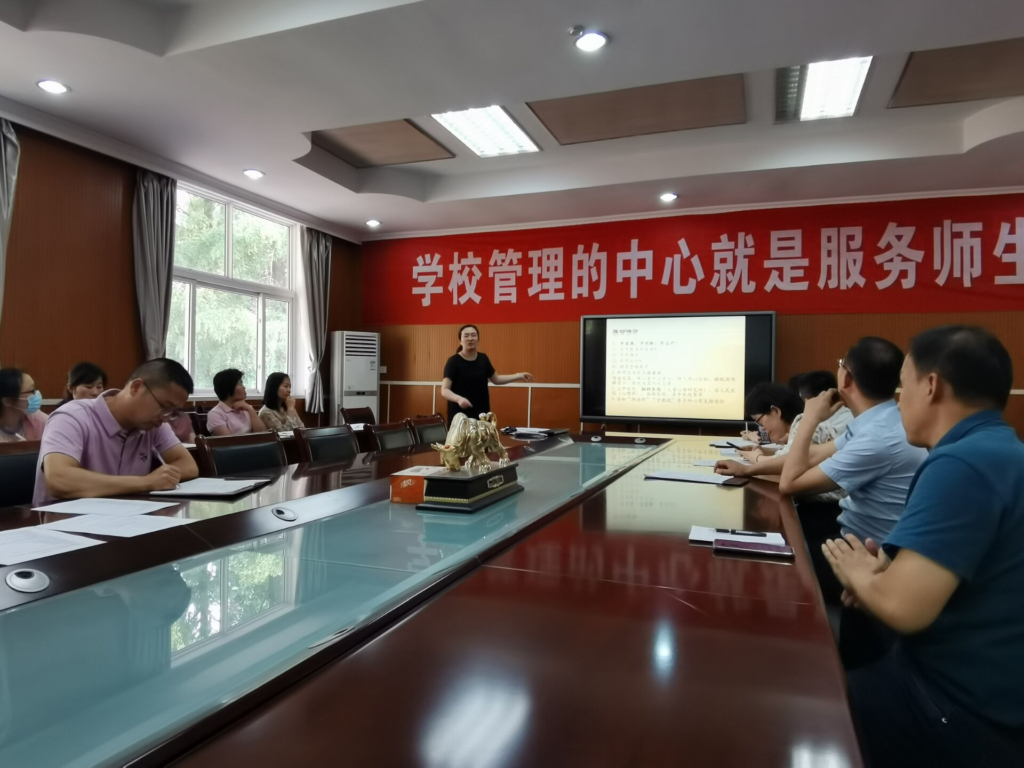
This training has been an important part of the school’s “life education” of mental health education month.
Photo: Education information in Pukou, Nanjing
The increasing prevalence of depression during the epidemic has led to higher awareness of mental health education and relevant departments swing into actions. However, this is just a starting point and is doomed to be a long journey to actually reap the harvest.
“Only persistence can prevent and intervene psychological problems up to the hilt and change the prejudice of depression in the society, as well as make patients receive better treatment,” said Yanran.
